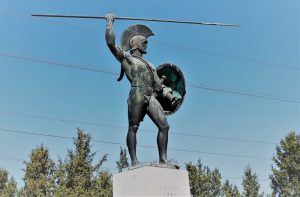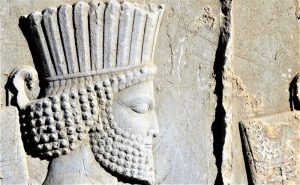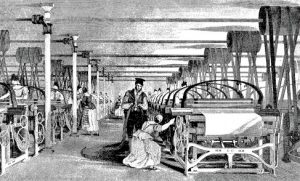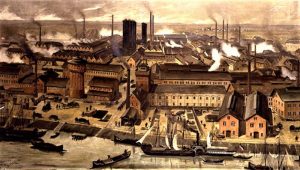French Revolution
The French Revolution, also known as the Revolution of 1789, was the revolutionary movement that shook France between 1787 and 1799 and reached its first climax in 1789. Hence the conventional term "1789 Revolution", which denotes the end of the Old Regime in France and also serves to distinguish that event from the later French revolutions of 1830 and 1848.
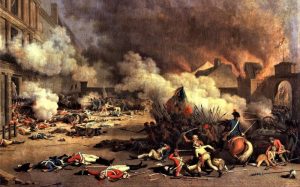
- When was it: From 07/14/1789 to 09/11/1799
- Where was it: France
What was the French Revolution?
It was a revolution that marked the end of a historical era and the beginning of the contemporary age, it marks a dividing line between the Ancient regime and the French Revolution: the monarchical absolutism that governed feudal society.
Summary
The French Revolution ended the system of absolute monarchies of the European countries, which was based on the principle that all powers resided in the king, who was the source of all power by divine right; such right was the legal and philosophical basis of his sovereignty.
The French Revolution separated these powers, making the legislative power belong to an Assembly or Parliament; the executive power to the king and his ministers, or in a government in the republics; and the judicial power in the courts of justice.
In short, it would seek to eliminate the monarchy or let it be absolute to become a political system in which they would control each other. It was also understood that sovereignty did not come but from the people, who delegated the exercise of power to freely elected rulers in periodic electoral processes.
Characteristics of French Revolution
The main characteristics of the French Revolution were the following:
- It created a new model of society and state.
- With it came the illustration that gave a new faith to reason and progress.
- The rights of men were affirmed.
- Popular participation of people began.
- The castles were looted and destroyed.
- Fiscal extensions were eliminated.
- The ideals of freedom, equality and fraternity were formulated.
- The feudal system and the privileges of the clergy were eliminated.
Causes
There were several causes for French Revolution, among them are:
- Economic: the main causes within the sphere of the economy were the fiscal deficit, the economic crisis, the debt owed by the State and the rise in prices without product control.
- Social: there was opposition to the privileges enjoyed by the tax reform and the bourgeoisie wanted to gain access to power. The popular classes began to emerge as an opposition force in the face of these situations. The most privileged were categorically opposed to paying new taxes and for this reason they rebelled against the increase.
- Politics: The Enlightenment and its ideals began to be generated, and an attempt was made to follow the example of U.S. independence.
Aims and Objectives
The main objectives of French Revolution were:
- To put an end to the monarchy.
- To eliminate the feudal system and excessive privileges and inequalities.
- Build a more modern state.
- Declare the rights of man and citizens.
- To create the French Republic.
- Separate the powers of the State and establish sovereignty.
Stages
The French Revolution lasted 10 years and its phases were as follows:
- Meeting of the General States in 1789: the monarch Louis XVI summoned the representatives to the assembly. The clergy, the nobility and some people’ representatives discussed aspects such as misery, crisis, bad harvests and hunger.
- National Assembly and revolt of 1789 and 1791: the people and members of the bourgeoisie requested the individual vote without results and when they were rejected, they constituted the National Assembly as the maximum representation of the nation.
- Taking of the Bastille in 1789: on July 14 of that year, the Bastille that was a prison was taken by the people facing the danger that the bourgeoisie would eliminate the assembly. This was the official beginning of the French Revolution. The National Assembly became a National Constituent Assembly abolishing feudalism and its rights and privileges. The rights of man were published with the ideals of equality, fraternity and freedom.
- Legislative Assembly of 1791 and 1792: people followed discontent and the strongest ideas of revolution.
- The convention and the republic: the French monarchy falls when the people attack the Tuileries palace finding a series of documents that proved their betrayal. The first elections were held by universal suffrage, in which only men participated.
- The Directory: the council of elders is created and the Five Hundred by popular election. These chambers were dominated by the conservative bourgeois class and implemented policies that annoyed the people. Napoleon Bonaparte carried out a coup d’état and was later appointed first consul.
Most important facts
Among the most important facts we can mention:
- The monarchies were eliminated.
- There was the separation of church and state.
- It was passed from the monarchic absolutism to the parliamentary type monarchy and to the Republic.
- The executive, legislative and judicial powers were created.
- The seizure of the bastille and the declaration of human rights in 1789.
- Constitution of 1791 and the king’s escape.
- The coup d’état of Napoleon in 1799 which puts an end to the revolution.
Consequences
The abolition of absolute monarchy in France was a direct consequence of the process which succeeded in putting an end to the privileges of the aristocracy and clergy. Servitude, feudal rights and tithes were eliminated; property was disintegrated and the principle of equitable distribution in the payment of taxes was introduced.
The principles of freedom of worship and freedom of expression written in the Declaration of Human Rights were established, freedom of conscience and civil rights for Protestants and Jews were initiated.
The first Constitution was formed, and the ecclesiastical goods were eliminated so that, they were passed on to the nation to solve economic problems.
Achievements
Among the most important achievements of the revolution we can mention that important changes were made in European politics, it was a social model that transformed the economy and the role played by social classes. Enlightenment ideas triumphed over the monarchy and the United States was born creating a new political system.
Impact of French Revolution
Its impact was enormous, its ideas, values and the model that emerged from it spread worldwide and are still being practiced. It influenced human rights, democracy and the shaping of today’s world. The new policy he created based on political change through voluntary action and the movement of the masses reached different countries that were already fighting colonialism to achieve independence.
Leaders and characters
- Louis XVI of France, who was the king of France and who was overthrown and beheaded.
- Marie Antoinette: Queen of France who exerted a great influence ignoring the misery of the people.
- Charles X: younger brother of Louis XVI.
- Anne-Robert Jacques Turgot: French economist and politician who enshrined economic and social reform.
- Jacques Necker: one of the most notable bankers of the time.
- Voltaire: writer and disseminator of the secular creed that guided the theoreticians of the Revolution.
- Maximilien de Robespierre: politician who established the regime of Terror.
- Marquis de la Fayette: French soldier and politician who exercised a liberal political ideology.
Symbols
The most used symbols during the French Revolution were:
- The Phrygian cap: it was a symbol of freedom and was consecrated as a symbol of freedom and republicanism.
- The Marseillaise: current anthem of France that began as a song of revolutionary war and freedom.
- The guillotine: machine used for decapitation.
- La Cocarde: symbol representing the union of the people and the king.
Women during the French Revolution
It was very intense, although this story is not told. The women fought for the feminist demands and their social status because they knew what food cost and the difficulties in getting their families through. Their struggle bore results in the summer of 1793, when they achieved political equality in the sections, assemblies and popular societies. Some of them were:
- Olympe De Gouges
- Mary Wollstonecraft
Social classes during the French Revolution
- Clergy: they were the first social class and had enormous wealth and influence over France. It was divided into high and low clergy.
- Nobility: they were descendants of the feudal lords and had large extensions of payment of which they did not pay taxes by exploiting the peasants.
- Plain State: known as the Third State and made up the great majority of the population of France. They had no privileges, paid many taxes and suffered hunger and misery.
- Peasantry: workers who worked in the fields for the feudalists, worked a lot and earned very little.
Phrases
Among the most recognized phrases that emerged during the French Revolution we mention:
- When people rebel, we do not know how they will be able to return to calm, and when they are calm, we do not understand how revolutions can take place.
- The revolution does not choose its paths: it took its first steps towards victory under the belly of a Cossack’s horse.
- Oppressed people have the right to rise up and break their chains as soon as they can.
- All men recognize the right to revolution, that is, the right to refuse obedience and to rise up against the government when its tyranny or incompetence is great and intolerable.
How to cite this article?
Briceño V., Gabriela. (2019). French Revolution. Recovered on 23 February, 2024, de Euston96: https://www.euston96.com/en/french-revolution/




